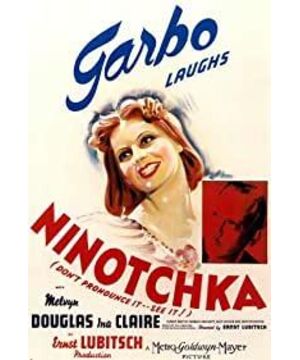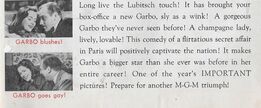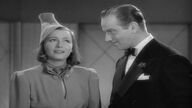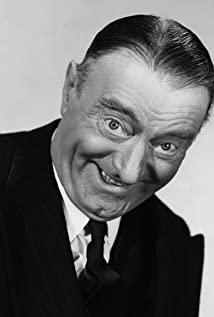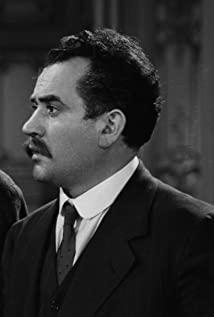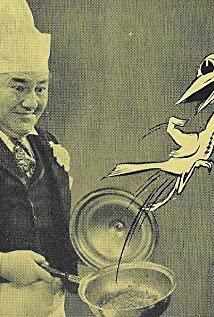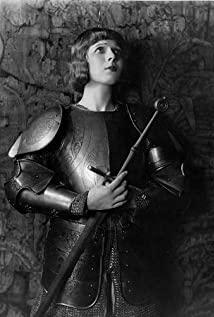This film was shot in 1939, and the prelude of the Cold War was not kicked off until 1947, but as early as ten years ago, the ideological opposition between the United States and the Soviet Union was already very obvious in this film, and it also aroused my concern. Some curious.
This is the first film I have watched starring Garbo. My previous impression of her was some stills, the Queen of Sweden, the beauty of the iceberg, and in this film, she played a glamorous and frosty Soviet Russian female cadre. When I first arrived in the United States, the whole person was like a red AI, like a cold machine, inhumane, in sharp contrast with the French male nobles who ardently pursued her. This kind of character setting and men's and women's collocation can be regarded as the prototype of some later romance works (for example, for example, for example, the Japanese drama "Dating ~ What Is Love~" is also such a cold working machine. Later, after being nourished by love It's becoming more and more humane), early Hollywood really abounds in various classic popular bridges.
However, the setting for the role of Russia here is really typical. After the glamorous female cadres came to the United States, they were influenced by the material and men of the capitalist world (it can even be said to be one of the inspiration sources for the image of the black widow in the Marvel universe) The Soviet men who are strong in the outside world and love to drink are corroded as soon as they enter the world of capitalism. This overlaps with the image of Russians portrayed in the American mass media during the Cold War and even after the Cold War.
On the one hand, there should be a trick that the United States is familiar with, which is to use a condescending and inexplicable attitude to describe the stereotypes of other cultural backgrounds in the world. For example, in the presentation of Asians back then, the male was Fu Manchu, Chen Charlie, Either treacherous or weak, and the female is Mrs. Susie Wong Butterfly, either sexy "easy" or showing a kind of low eyebrows, waiting for the rescue of white American men. (Even to this day this kind of stereotype still has a market)
The image of "barbarians/heretics/outsiders" in the United States basically followed the tradition of modern Western countries. As early as the nineteenth century, the "yellow peril theory" was popular in Germany, including later Oriental studies. Among this kind of prejudice, China is one category as the East/Far East, Ottoman and Arab are one category as Islam, and the black African Indian is another category. They are all treated as "heretics" "outside civilization" and treated directly. The other is.
(Regarding the concept of otherness, the simple understanding is to emphasize the enemy and ourselves. "We" is different from "them." Think of "them" as the same people as "us", so they can engage in discrimination and prejudice with peace of mind.)
The situation in Soviet Russia is different from the above. It is an existence between "us" and "them" in the United States/Western Europe. On the one hand, the country has the characteristics of a modern political system, military system, and economic system, but at the same time It is also considered to be a Slavic nation with a low degree of civilization, cultural literacy, and social development, and belongs to a country with uncivilized but very powerful powers.
After the October Revolution, the Third International System was again a system that was incompatible with all political systems in Europe and the United States at the time. It was also very different from the Second International/Socialist Party/Labor Party. It was not in terms of domestic politics or foreign policy. same. (I won’t go into details here. I suggest you learn about party history.)
So at this time, Soviet Russia is no longer an existence that can be discriminated from condescendingly to the United States, but an existence that must be ridiculed and fearful. And what I didn’t understand before was that, in fact, the influence and attraction of the October Revolution among American people was very large. Therefore, the hostility of the United States towards the Soviet Union became more acute at that time. "Civilization and barbarism are on the edge, clumsy but powerful" Russia.
In addition, the United States has always been accustomed to calling itself a "chosen son" and really likes to set up a target for itself. This target should preferably be "heretical" and strong enough. For example, in the early 20th century, this target was colonialism and Monarchy despotism, and after the end of the First World War, colonialism declined and the four autocratic empires (Germany, Austria-Hungary, Tsarist Russia, and Ottoman) collapsed, and the Red Soviet Union came into being.
After understanding this long list of backgrounds, you can see more implication by going to the Hollywood movies of that time. In fact, watching mainstream American movies, such as the early classic Hollywood, and now the Disney series, combined with the international background at that time, can see a lot of intentions and unconsciousness. The film is not only a communicator, conveying their understanding of the world to the audience, but also a feedback. The film also reflects the official and private perceptions of many issues at that time, which is very meaningful.
Finally, let’s return to this movie. Although this movie is American-style propaganda, it cannot be said that the depiction of the Soviet Union in it is wrong. After all, the real Stalin era is probably much more terrifying than what is shown in the movie. The frivolous attitude presented is uncomfortable. It is a typical American attitude that is condescending, self-righteous, feels that other places are backward, ridiculous, and need to be saved. But do they really care about those people? They may be more concerned about their posture. Instead, she understood that Guo Wanying in "Shanghai's Golden Branches and Jade Leaves" was unwilling to tell the BBC and other foreign media about the Cultural Revolution complaints in her later years. They would not really understand and would only use your words as their political intentions. Therefore, I feel more and more that the pathfinding China series written by He Wei is so rare. It is a peaceful, objective, truly empathetic, and not self-righteous perspective.
View more about Ninotchka reviews


